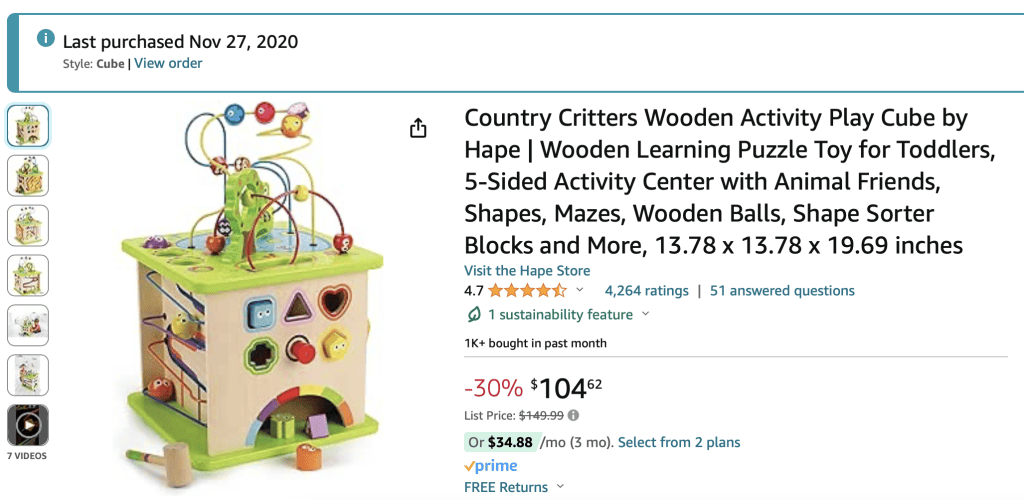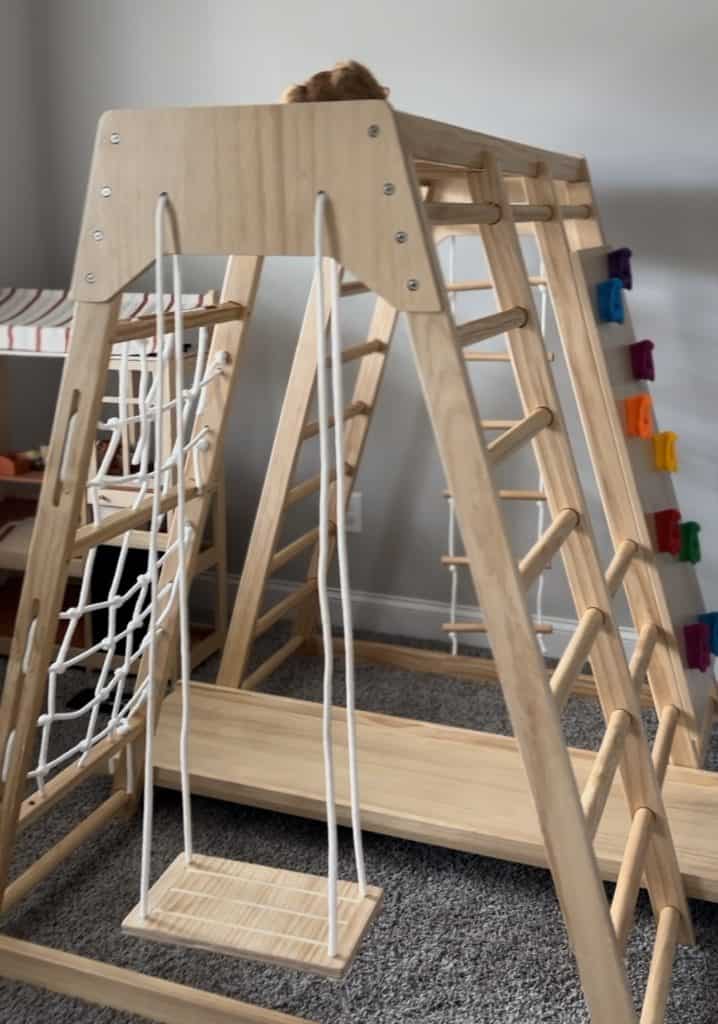Best List Of Gifts For Toddlers
This post may contain affiliate links, which means I’ll receive a commission if you purchase through my links, at no extra cost to you. Please read full disclosure for more information.
Whether you are buying a gift for Christmas or a birthday, this comprehensive list of gifts for toddlers is exactly what you need.
I categorized the list from ages 1-2 and 2-4. This way you can find the perfect age appropriate toy for the little one.
Gifts For Toddlers Ages 1-2
Keep in mind that some of these toys might be better for one year olds than two year olds and vice versa. I recommend choosing the toy that caters best to the toddler’s milestone and development!
1. Wooden Activity Cube
There’s a ton of different wooden activity cubes all over the internet. And prices will range quite a bit.
I decided to bite the bullet and go for the big boy. This was one of the more expensive wooden activity cubes I found. But the quality 100% backed it up. The cheaper ones had crappy reviews from saying how some parts were hazardous and other reviews were concerned about the overall quality.
As you can see from the screenshot below, I purchased it on November 27, 2020 and it stayed in amazing shape for 4 years.

There are other smaller ones like this wooden activity table from Target that is at a more affordable price point than the first one.
2. Mega Blocks
I originally bought Mega Blocks for my first child when she was one year old. Her and her sister now play with this set five years later. It held up in quality and has been a hit in the family.

There are bigger sets and different colors like this one that is more gender neutral and for a household with more than one toddler.
3. Pull Wagon
Fisher-Price Laugh and Learn Pull and Play Learning Wagon has been another favorite in our household.
It’s the perfect toy for a baby who’s still learning to walk that can grow with them.
It’s a 3-in-1 toy. You can pull it, keep it stationary, learn from the interactive sounds, buttons, and shapes, and it comes with extra smaller toys.
4. Activity Table
Activity tables are some of the best toys for younger toddlers. It helps improve their fine motor skills, creativity, and provides sensory stimulation.
5. Walker
Walkers can be used even before your toddler turns one. My first daughter would only get in this Winnie the Pooh baby walker. It helped her start walking at just 8 months.
The best thing about this walker was that the trays came out to lay snacks or other toys to keep her occupied.
Vtech sit to stand baby walker is better suited for toddlers that are in the process of learning how to walk independently. It’s got two different settings for the walker to freely move or slowly move as the toddler learns to walk.
Related Posts
10 Motherhood Lessons Learned As A Mom of Three
10 Simple Ways To Encourage Your Baby To Walk From A Parent Of An 8-Month-Old Walker
20 Things I Used To Enjoy But Dread After Life With A Baby
Everything You Need To Throw The Sweetest Donut Themed First Birthday Party For Your Baby
6. Balance Bike
A balance bike really set my toddler up for success when learning how to ride an actual bike. The bike below is one we got from Coco Village. These also range in price.

This one isn’t a balance bike but I strolled my daughter around in it since she was almost 2. You can detach the handle and it turns into a little bike.
7. Books
My girls LOVE this interactive book we got for one of their birthdays. It helped promote a healthy relationship with reading and has been a fun way to get the girls to be interesting in books.
8. Bath Toys
Bath time is way more enjoyable with toys. There are bath crayons that toddlers can write on the bathtub and be easily removed.
Or other fun bath toys that squirt water.
If you want to amp up bath time a couple notches, you can get one of these that will get any toddler excited for a bath! You truly cannot go wrong with any bath toy as a gift.
9. Baby Dolls
This is definitely the time where toddlers become interested in baby dolls. It’s also a perfect gift for a toddler whose family is expecting another little one. It helps them prepare their toddler for their future sibling.
10. Stuffed Animals
Toddlers love stuffed animals. Whether it’s a Squishmallow or a fuzzy stuffed animal, it would make for a great gift.
11. Outdoor Activities
I love getting toddlers toys that promote outside play.
Some of my girls favorite things were the sprinkler play area, the bubble lawn mower, and the Little Tikes slide.
12. Kids Tents and Tunnels
Toddlers will have endless play in these tents and tunnels. They could also start imaginary play with this play tent.
13. Toddler Chair or a Nugget
Another great toddler gift is a toddler chair that converts into a perfect nap time area. Or you can upgrade to a Nugget especially if you have more than one child. I love our Nugget because my girls like to build a fort with it.
14. Toy Instruments
Toy instruments can make for a good toy for the musically inclined toddlers. If your toddler loves Bluey, there are Bluey specific toy instruments like this play piano.
Gifts For Toddlers Ages 2-4
1. Ride On Toy
You can’t go wrong with any ride-on toy. A scooter, toddler bike, battery powered ride on toy, or possibly even their first hoverboard (know your toddler before purchasing).
2. Personalized Blanket
Personalized gifts are some of my favorites to gift others. And toddlers love getting cozy.
What better gift than a personalized blanket that can also be stored away as a keepsake later on in the future.
3. Toddler Camera
My girls love their toddler camera. It’s so user friendly and they have a blast clicking away. You can even save all of their photos in a box for later.
4. Crayons and Coloring Books
My favorite place to buy coloring books is Target. I feel like it makes for a great extra gift on top of whatever else I get them.
5. Sports Center
The VTech Smart Shots Sports Center is such a fun interactive toy for toddlers. This was another favorite in our house.
6. Wooden Climbing Triangle

This wooden climbing triangle is such a great alternative to the bigger wooden indoor playgrounds especially if your toddler is learning to be coordinated.
7. Indoor Playground

Please don’t mind this awful quality photo. I screenshotted it from a video I took because I couldn’t find a single picture of this Avenlur indoor playground in my phone.
The middle wooden piece that’s laying across can be moved up to be used as a slide. But when my tiny little 20 month old is in the playroom and I am out of the room, I put it down!
It comes in a medium and large size. The one we bought is in a large! I have a friend who bought the medium and wished she had just spent the extra $100 for the large playground. I talk about the Avenlur wooden indoor playground in my playroom ideas post!
8. Toddler Table and Chairs Set
My girls love sitting at their table (the link takes you to the exact one we have and it’s much bigger than the first one we got and love it!) playing with their toys and taking a snack break.
There are smaller tables with just two chairs such as this one.
9. Art Toys
Another great gift idea for toddlers is Crayola’s mess free painting station.
An easel would be a fun art toy for toddlers close to the age of 4.
10. Magnetic Tiles
Magnetic tiles have been a huge hit this past Christmas. It makes for the perfect sensory Montessori toy.
Toddler Gift Ideas
Make sure to save this gifts for toddlers list for later. I hope it guides you on your birthday or Christmas shopping trip! Leave me a comment below and let me know what you ended up getting from the list above!




